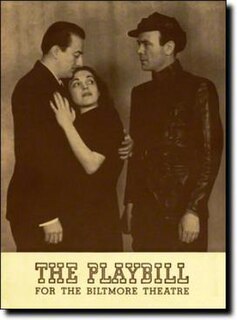
Alice O'Connor, better known by her pen name Ayn Rand, was a Russian-born American writer and philosopher. She is known for her fiction and for developing a philosophical system she named Objectivism. Born and educated in Russia, she moved to the United States in 1926. She wrote a play that opened on Broadway in 1935. After two early novels that were initially unsuccessful, she achieved fame with her 1943 novel, The Fountainhead. In 1957, Rand published her best-known work, the novel Atlas Shrugged. Afterward, until her death in 1982, she turned to non-fiction to promote her philosophy, publishing her own periodicals and releasing several collections of essays.

Objectivism is a philosophical system developed by Russian-American writer Ayn Rand. Rand first expressed Objectivism in her fiction, most notably The Fountainhead (1943) and Atlas Shrugged (1957), and later in non-fiction essays and books. Leonard Peikoff, a professional philosopher and Rand's designated intellectual heir, later gave it a more formal structure. Rand described Objectivism as "the concept of man as a heroic being, with his own happiness as the moral purpose of his life, with productive achievement as his noblest activity, and reason as his only absolute". Peikoff characterizes Objectivism as a "closed system" insofar as its "fundamental principles" were set out by Rand and are not subject to change. However, he stated that "new implications, applications and integrations can always be discovered".

The Fountainhead is a 1943 novel by Russian-American author Ayn Rand, her first major literary success. The novel's protagonist, Howard Roark, is an intransigent young architect, who battles against conventional standards and refuses to compromise with an architectural establishment unwilling to accept innovation. Roark embodies what Rand believed to be the ideal man, and his struggle reflects Rand's belief that individualism is superior to collectivism.

Nathaniel Branden was a Canadian–American psychotherapist and writer known for his work in the psychology of self-esteem. A former associate and romantic partner of Ayn Rand, Branden also played a prominent role in the 1960s in promoting Rand's philosophy, Objectivism. Rand and Branden split acrimoniously in 1968, after which Branden focused on developing his own psychological theories and modes of therapy.

Anthem is a dystopian fiction novella by Russian-American writer Ayn Rand, written in 1937 and first published in 1938 in the United Kingdom. The story takes place at an unspecified future date when mankind has entered another Dark Age. Technological advancement is now carefully planned and the concept of individuality has been eliminated. A young man known as Equality 7-2521 rebels by doing secret scientific research. When his activity is discovered, he flees into the wilderness with the girl he loves. Together they plan to establish a new society based on rediscovered individualism.

This is a bibliography for Ayn Rand and Objectivism. Objectivism is a philosophical system initially developed in the 20th century by Rand.

Barbara Joan Branden was a Canadian-American writer, editor, and lecturer, known for her relationship and subsequent break with novelist-philosopher Ayn Rand.

Harry Binswanger is an American philosopher. He is an Objectivist and a board member of the Ayn Rand Institute. He was an associate of Ayn Rand, working with her on The Ayn Rand Lexicon and helping her edit the second edition of Rand's Introduction to Objectivist Epistemology. He is the author of How We Know: Epistemology on an Objectivist Foundation (2014).

The Romantic Manifesto: A Philosophy of Literature is a collection of essays regarding the nature of art by the philosopher Ayn Rand. It was first published in 1969, with a second, revised edition published in 1975. Most of the essays are reprinted from Rand's magazine The Objectivist.

The Objectivist movement is a movement of individuals who seek to study and advance Objectivism, the philosophy expounded by novelist-philosopher Ayn Rand. The movement began informally in the 1950s and consisted of students who were brought together by their mutual interest in Rand's novel, The Fountainhead. The group, ironically named "the Collective" due to their actual advocacy of individualism, in part consisted of Leonard Peikoff, Nathaniel Branden, Barbara Branden, Alan Greenspan, and Allan Blumenthal. Nathaniel Branden, a young Canadian student who had been greatly inspired by The Fountainhead, became a close confidant and encouraged Rand to expand her philosophy into a formal movement. From this informal beginning in Rand's living room, the movement expanded into a collection of think tanks, academic organizations, and periodicals.
The Randian hero is a ubiquitous figure in the fiction of 20th-century novelist and philosopher Ayn Rand, most famously in the figures of The Fountainhead's Howard Roark and Atlas Shrugged's John Galt. Rand's self-declared purpose in writing fiction was to project an "ideal man"—a man who perseveres to achieve his values, and only his values.

The Fountainhead is a 1949 American black-and-white drama film produced by Henry Blanke, directed by King Vidor, and starring Gary Cooper, Patricia Neal, Raymond Massey, Robert Douglas and Kent Smith. The film is based on the bestselling 1943 novel of the same name by Ayn Rand, who also wrote the screenplay adaptation. Although Rand's screenplay was used with minimal alterations, she later criticized the editing, production design and acting.

Atlas Shrugged is a 1957 novel by Ayn Rand. Her fourth and final novel, it was also her longest, and the one she considered to be her magnum opus in the realm of fiction writing. Atlas Shrugged includes elements of science fiction, mystery, and romance, and it contains Rand's most extensive statement of Objectivism in any of her works of fiction. The theme of Atlas Shrugged, as Rand described it, is "the role of man's mind in existence". The book explores a number of philosophical themes from which Rand would subsequently develop Objectivism. In doing so, it expresses the advocacy of reason, individualism, and capitalism, and depicts what Rand saw to be the failures of governmental coercion.

Ayn Rand: A Sense of Life is a 1996 American documentary film written, produced, and directed by Michael Paxton. Its focus is on novelist and philosopher Ayn Rand, the author of the bestselling novels The Fountainhead and Atlas Shrugged, who promoted her philosophy of Objectivism through her books, articles, speeches, and media appearances.
Red Pawn is a screenplay written by Ayn Rand. It was the first screenplay that Rand sold. Universal Pictures purchased it in 1932. Red Pawn features the theme of the evil of dictatorship, specifically of Soviet Russia.

Michael Paxton is an American filmmaker and writer. He has directed, produced, and written several films, both live action and animated, as well as plays and books. His feature documentary Ayn Rand: A Sense of Life received an Academy Award nomination for Best Documentary Feature and a Golden Satellite Award for Best Documentary film in 1997. Paxton currently works as Multimedia Producer for the Ayn Rand Institute.

Journals of Ayn Rand is a book derived from the private journals of the novelist and philosopher Ayn Rand. Edited by David Harriman with the approval of Rand's estate, it was published in 1997, 15 years after her death. Some reviewers considered it an interesting source of information for readers with an interest in Rand, but several scholars criticized Harriman's editing as being too heavy-handed and insufficiently acknowledged in the published text.

Goddess of the Market: Ayn Rand and the American Right is a 2009 biography of Ayn Rand by historian Jennifer Burns. The author explores Rand's intellectual development and her relationship to the conservative and libertarian movements. The writing of Rand's books and the development of her philosophy of Objectivism are also covered.

Ideal is a posthumously published 2015 novel by Ayn Rand.

The Unconquered is a three-act play written by Russian-American author Ayn Rand as an adaptation of her 1936 novel We the Living. The story follows Kira Argounova, a young woman living in the Soviet Union in the 1920s. Her lover Leo Kovalensky develops tuberculosis. To get money for his treatment, Kira has an affair with a Communist official, Andrei Taganov. After recovering from his illness, Leo becomes involved with black market food sales that Andrei is investigating. When Andrei realizes that Kira loves Leo, he helps his rival avoid prosecution, then commits suicide. Leo leaves Kira, who decides to risk her life escaping the country.
















